- Home
- Julia Quinn
The Girl With the Make-Believe Husband Page 11
The Girl With the Make-Believe Husband Read online
Page 11
What other choice did she have?
He set the soup on the table and took her hand. “I want to find Thomas as much as you do.”
“I know.” Cecilia looked down at their entwined fingers. It was odd how well they seemed to fit together. His hands were large and square, his skin tanned and rough from work. And hers—well, they were no longer so white and delicate, but she took pride in her newfound calluses. They seemed to say that she was capable, that she could take control of her own destiny. She saw strength in her hands, strength she had not known she possessed.
“We will find him,” Edward said.
She looked up. “We might not.”
His eyes, almost navy blue in the fading light, settled on hers.
“I must be realistic,” she said.
“Realistic, yes,” he said, “but not fatalistic.”
“No.” She managed a little smile. “I’m not that.”
Not yet, anyway.
They did not speak for a few moments, and the silence, which began as something companionable, grew heavy and awkward as Cecilia realized that Edward was trying to figure out the best way to broach an uncomfortable topic. Finally, after clearing his throat several times, he said, “I would like to know more about our marriage.”
Her heart stopped. She’d known this was coming, but still, for a brief moment she could not breathe.
“I do not question your word,” he said. “You are Thomas’s sister, and I hope you will not judge me as too forward if I tell you that I have long felt that I know you from your letters to him.”
She had to look away.
“But I would like to know how it all came about.”
Cecilia swallowed. She’d had several days to come up with a story, but thinking about a lie wasn’t the same as saying it out loud. “It was Thomas’s wish,” she told him. This much was true, or at least she assumed it was. Surely her brother would want to see his dearest friend marry his sister. “He was worried about me,” she added.
“Because of your father’s death?”
“He does not know of that,” Cecilia answered honestly. “But I know that he has long been concerned about my future.”
“He had said as much to me,” Edward confirmed.
She looked up in surprise. “He did?”
“Forgive me. I do not wish to speak ill of the dead, but Thomas had intimated that your father was less concerned with your future than he was with his present.”
Cecilia swallowed. Her father had been a good man, but also a fundamentally selfish one. Still, she’d loved him. And she’d known that he’d loved her to the best of his ability. “I brought comfort to my father’s life,” she said, picking her words as if walking through a field of flowers. There had been good times too, and these were what she wished to gather into a bouquet. “And he gave me purpose.”
Edward had been watching her closely as she spoke, and when she chanced a look in his eyes she saw something she thought was pride. Mixed for certain with skepticism. He saw through her words, but he admired her for saying them.
“Anyway,” she said, trying to lighten her tone, “Thomas knew that my father was ailing.”
Edward’s head tipped to the side. “I thought you said it was sudden.”
“It was,” she said hastily. “I mean, I think it’s often like that. Very slow, and then quite quick.”
He didn’t say anything.
“Or maybe it’s not,” she said. Dear God, she sounded like an idiot, but she couldn’t seem to shut her mouth. “I haven’t much experience with the dying. None, actually, except for my father.”
“Nor I,” Edward said. “Not with natural death, at least.”
Cecilia looked at him. His eyes had gone dark.
“I do not count the battlefield as natural,” he said quietly.
“No, of course not.” Cecilia didn’t even want to think about what he had seen. The death of a young man in his prime was far different than the passing of a man her father’s age.
Edward took another sip of his soup, and Cecilia took this to be a signal that she should continue with her tale. “Then my cousin asked for my hand,” she said.
“I take it from your tone that this was not a welcome proposal.”
Her mouth grew tight. “No.”
“Your father did not rebuff him? Wait”—Edward’s hand rose a few inches, his forefinger flexed the way one did before raising a point in a conversation—“was this before or after he died?”
“Before,” Cecilia replied. Her heart sank an inch. This was where the lies began. Horace had not become a menace until after her father had died, and Thomas had never known that he had begun to pressure Cecilia to marry him.
“Of course. It would have to have been because . . .” Edward frowned, pulling his hand from hers and rubbing his chin. “Maybe it’s my head slowing me down, but I can’t keep the timeline straight. I might need you to write this down for me.”
“Of course,” Cecilia said, but her guilt beat inside her like a drum. She could not believe she was letting him think he was the reason the story was so difficult to follow. She tried for a smile, but she wasn’t sure she managed more than a twitch of her lips. “I can hardly believe it either.”
“I’m sorry?”
She should have known she would have to explain that comment. “Just that I can’t quite believe I’m here. In New York.”
“With me.”
She looked at him, at this honorable and generous man she did not deserve. “With you.”
He took her hand and brought it to his lips. Cecilia’s heart melted a little, even as her conscience sobbed. Why did this man have to be so bloody nice?
She took a breath. “Marswell is entailed, and Horace will inherit if something should happen to Thomas.”
“Is that why he proposed?”
She gave him a look. “You don’t think he was overwhelmed by my natural charm and beauty?”
“No, that would be why I proposed.” Edward started to grin, but it quickly fell to a grimace. “I did propose, didn’t I?”
“Sort of. Ah . . .” She felt her face burn. “It was more of, ah . . .” She leapt upon the only possible answer. “Actually, Thomas took care of most of the arrangements.”
Edward did not appear happy with this turn of events.
“It could hardly have happened any other way,” Cecilia pointed out.
“Where was the ceremony?”
She’d thought of that one. “On the ship,” she said.
“Really?” He looked frankly baffled by the whole thing. “Then how did I . . . ?”
“I’m not sure,” Cecilia said.
“But if you were on the ship, when did I . . . ?”
“Just before you left for Connecticut,” Cecilia lied.
“I went through the ceremony three months before you did?”
“They don’t have to take place at the same time,” Cecilia said, aware that she was digging herself in ever deeper. She had more excuses prepared—that the vicar in her village refused to perform a proxy marriage, or that she had not wanted to say her vows until it became absolutely necessary so that Edward might withdraw from the marriage if he changed his mind. But before she could bring herself to utter another falsehood, she realized that he was stroking her finger, right where a ring ought to be.
“You don’t even have a ring,” he said.
“I don’t need one,” she said quickly.
His brow drew into a firm line. “You need one.”
“It can wait, though.”
Then, with a movement so sudden she wouldn’t have thought him capable of it in his current condition, he pushed himself upright and touched her chin. “Kiss me,” he said.
“What?” she practically yelped.
“Kiss me.”
“You’re mad.”
“It’s possible,” he said agreeably, “but I think any man would be quite sane to want to kiss you.”
“Any man,” she echoed, still
trying to make sense of the moment.
“Perhaps not.” He pretended to consider this. “I think I might be the jealous sort. So it would probably be quite foolish on their part.”
She shook her head. Then rolled her eyes. Then did both. “You need to rest.”
“A kiss first.”
“Edward.”
He mocked her tone to perfection. “Cecilia.”
Her mouth fell open. “Are you making puppy eyes at me?”
“Is it working?”
Yes.
“No.”
He hmmphed. “You’re not a very accomplished liar, are you?”
Oh, he had no idea.
“Finish your broth,” she ordered, trying—and failing—to sound stern.
“Do you mean to imply I don’t have the strength to kiss you?”
“Oh my goodness, you’re insufferable!”
One of his brows rose into a perfectly arrogant arch. “Because I’ll have you know I take that as a dare.”
She pressed her lips together in a futile attempt to hold back a smile. “What has got into you?”
He shrugged. “Happiness.”
Just one word, and it knocked the breath right out of her. Underneath his honorable exterior, Edward Rokesby had a streak of playfulness a mile wide. She supposed she shouldn’t have been so surprised. She’d seen hints of it in his letters.
All he’d needed to unlock it was a spot of joy.
“Kiss me,” he said again.
“You need to rest.”
“I just napped for three hours. I’m ridiculously awake now.”
“One kiss,” she heard herself saying, even as her mind was warning her not to do it.
“Just one,” he agreed, then added, “I’m lying, of course.”
“I’m not sure it counts as a lie if you confess to it in the same breath.”
He tapped his cheek, reminding her.
Cecilia caught her lower lip between her teeth. Surely one kiss wouldn’t hurt. And on the cheek, even. She leaned in.
He moved his head. Her lips touched his.
“You tricked me!”
His hand came to the back of her head. “Did I?”
“You know you did.”
“Did you realize,” he murmured, his breath hot and seductive against the corner of her mouth, “that when you speak against my lips it feels like a kiss?”
She nearly groaned. She did not have the strength to resist him. Not when he was like this—funny and endearing and so obviously delighted to have woken up to find himself married to her.
And now his lips were moving against hers, brushing slowly back and forth in a kiss that should have seemed chaste. But there was nothing innocent in the way her body arched toward his, eager for more. She’d been half in love with this man before they’d even met, and now her body recognized what her mind did not wish to admit—she wanted him, desperately, and in every way.
If he were not ill, if he were not still so weak, heaven only knew what would happen. Because she was not sure she would have the strength to stop them from consummating a marriage that did not even exist.
“You are the best medicine,” Edward murmured against her skin.
“Don’t discount the laudanum,” she tried to joke. She needed to lighten the moment.
“I don’t,” he said, pulling back just far enough to look into her eyes. “Thank you for insisting that I take it. I do think it was a help.”
“You’re welcome,” Cecilia said a little hesitantly. The change of topic was somewhat disorienting.
He stroked her cheek. “It’s part of the reason I said that you are the best medicine. I spoke with the people at the hospital, you know. Yesterday, after you left.”
She shook her head. She wasn’t sure where he was going with this.
“They told me how well you cared for me. They told me that you insisted upon a higher standard of care than I might have received otherwise.”
“Of—of course,” she stammered. This had nothing to do with her being his wife. She would have done this regardless.
“One of them even said he did not think I would have awakened if not for you.”
“I’m sure that’s not true,” she said, because she could not take credit for that. And she could not let him think he owed her for it.
“It’s funny,” he murmured. “I can’t recall thinking very much about getting married. I certainly don’t recall thinking about being married. But I think I like it.”
Tears began to pool in Cecilia’s eyes. He reached out and brushed them away.
“Don’t cry,” he whispered.
“I’m not,” she said, even though she was.
He smiled indulgently. “I think this might be the first time I’ve kissed a girl and made her cry.”
“Georgie Porgie,” she whispered, grateful for the distraction.
This seemed to amuse him. “It is my middle name.”
She drew back, needing to put a little distance between them. But his hand slipped from her cheek to her shoulder and then down her arm to her hand. He would not let go, and she knew that deep in her heart, she did not want him to.
“It’s getting late,” he said.
She glanced toward the window. She’d long since pulled the curtains shut, but she could see around the edges that the day had fallen past dusk and was now somewhere close to night.
“Will you sleep tonight?” he said.
She knew what he was asking. Would she sleep in this bed?
“You need not feel uncomfortable,” he said. “Much as I wish it were otherwise, I am not in any condition to make love to you.”
Her face burned. She couldn’t help it. “I thought you said you weren’t tired,” she mumbled.
“I’m not. But you are.”
He was right. She was exhausted. She would have slept when he did, except that she’d felt she needed to watch over him. He’d looked so awful when she’d put him to bed earlier that evening. Worse, almost, than when he’d been in hospital.
If something happened to him, after all that had transpired . . .
She could not bear to consider it.
“Have you eaten?” he asked.
She nodded. She’d had a light meal when she’d gone down to get the broth.
“Good. We do not want the nurse to become the patient. I assure you, I would not be nearly so proficient in the role as you are.” His face grew serious. “You must rest.”
She knew this. She just didn’t see how it was possible.
“I’m sure you still wish for modesty,” he said, his own face taking on a slightly discomfited hue. Cecilia felt a little better knowing that he too saw the irregularity in their current situation.
“I give you my word that I will turn the other way,” he said.
She just stared at him.
“While you change into your bedclothes,” he explained.
“Oh, of course.” God, she was an idiot.
“I’ll even pull the covers over my head.”
She rose to shaky feet. “That won’t be necessary.”
There was a pregnant pause, and then he said in a voice turned ever so hoarse, “It might.”
Cecilia let out a little gasp of surprise at his admission, then rushed over to the wardrobe where she’d unpacked her meager supply of clothing. She’d brought one nightgown, a serviceable dress of white cotton devoid of lace or frills. Not the sort of thing a lady might tuck into her trousseau trunk.
“I’ll just go over to the corner,” she said.
“I’m already under the covers.”
Indeed he was. While she’d been fetching her nightgown, he’d slid down until he was supine and had pulled the blanket over his face.
She would have laughed if she were not so utterly mortified herself.
With quick and efficient motions, Cecilia stripped off her clothing and jammed herself into her nightgown. It covered her from head to toe, just as much as any of her day frocks, and certainly more than
an evening gown would, but still, she felt indecently exposed.
She normally gave her hair fifty strokes with a brush before bed, but this seemed excessive, especially while he had a blanket over his head, so instead she braided it into a sleeping plait. As for her teeth . . . She looked down at the toothbrush and powder she’d brought with her from England, then back over at the bed. Edward had not moved.
“I’ll skip my teeth for tonight,” she said. Maybe it would make him less likely to want to kiss her the following morning.
She set the toothbrush back in the wardrobe and hurried over to the far side of the bed. Carefully, so as to disturb as little of the bedclothes as possible, she lifted the blanket and crawled in.
“You can open your eyes now,” she said.
He uncovered his face. “You’re very far away,” he said.
Cecilia pulled her right leg, which was half hanging off the side, back onto the bed. “I think it’s best,” she said. She leaned over and blew out the candle, allowing darkness to wash over the room.
It didn’t make her any less aware of the man lying next to her.
“Good night, Cecilia,” he said.
“Good night.” She shifted her position, rolling awkwardly onto her side with her back to him. This was how she generally slept, on her right side with her hands tucked under her cheek like a prayer. But it didn’t feel comfortable tonight, and it certainly didn’t feel natural.
She’d never fall asleep. Never.
And yet, somehow, she did.
Chapter 9
Do offer my greetings to Lieutenant Rokesby and assure him that if his siblings do not write as often as I, it can only be because they lead far more exciting lives. Derbyshire is nothing but dull this time of year. Oh, what am I saying? Derbyshire is always nothing but dull. It is a good thing, then, that I prefer an uneventful life.
—from Cecilia Harcourt to her brother Thomas
Edward woke slowly the following morning, his mind reluctant to pull itself out of what was an exceedingly delightful dream. He was in a bed, which was noteworthy in itself—he was fairly sure he had not slept in a proper bed in months. And he was warm. Toasty and lovely, but not too hot, the way one got during these oppressive New York summers.

 Just Like Heaven
Just Like Heaven B03.2 An Offer from a Gentleman Ep II
B03.2 An Offer from a Gentleman Ep II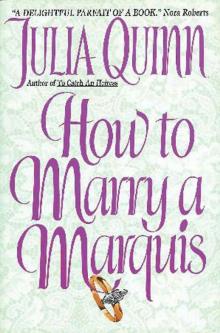 How to Marry a Marquis
How to Marry a Marquis When He Was Wicked: The 2nd Epilogue
When He Was Wicked: The 2nd Epilogue Ten Things I Love About You
Ten Things I Love About You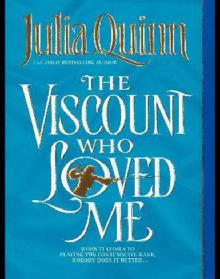 The Viscount Who Loved Me
The Viscount Who Loved Me The Duke and I
The Duke and I B05.2 To Sir Philip With Love Ep II
B05.2 To Sir Philip With Love Ep II An Offer From a Gentleman: The 2nd Epilogue
An Offer From a Gentleman: The 2nd Epilogue Minx
Minx On the Way to the Wedding with 2nd Epilogue
On the Way to the Wedding with 2nd Epilogue Mr. Cavendish, I Presume
Mr. Cavendish, I Presume A Night Like This
A Night Like This Splendid
Splendid Everything and the Moon
Everything and the Moon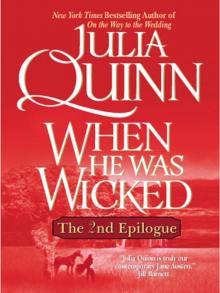 When He Was Wicked
When He Was Wicked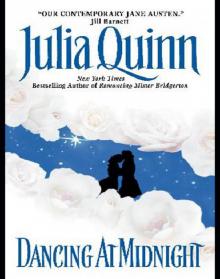 Dancing at Midnight
Dancing at Midnight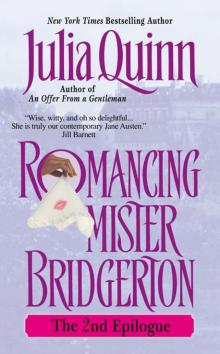 Bridgerton 04: 2nd Epilogue - Romancing Mister Bridgerton
Bridgerton 04: 2nd Epilogue - Romancing Mister Bridgerton The Lost Duke of Wyndham
The Lost Duke of Wyndham To Sir Phillip, With Love
To Sir Phillip, With Love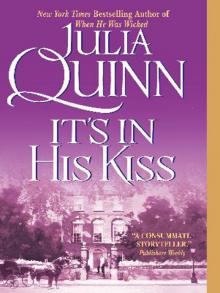 It's in His Kiss
It's in His Kiss The Other Miss Bridgerton
The Other Miss Bridgerton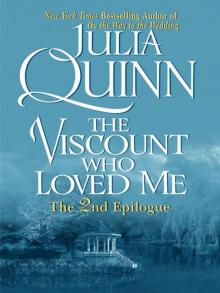 Bridgerton 02: 2nd Epilogue - The Viscount Who Loved Me
Bridgerton 02: 2nd Epilogue - The Viscount Who Loved Me The Secrets of Sir Richard Kenworthy
The Secrets of Sir Richard Kenworthy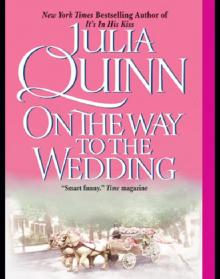 On the Way to the Wedding
On the Way to the Wedding The Secret Diaries of Miss Miranda Cheever
The Secret Diaries of Miss Miranda Cheever Because of Miss Bridgerton
Because of Miss Bridgerton What Happens in London
What Happens in London JQuinn - The Secret Diaries of Miss Miranda Cheever
JQuinn - The Secret Diaries of Miss Miranda Cheever The Girl With the Make-Believe Husband
The Girl With the Make-Believe Husband First Comes Scandal
First Comes Scandal To Catch an Heiress
To Catch an Heiress The Sum of All Kisses
The Sum of All Kisses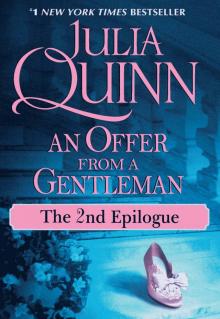 An Offer From a Gentleman
An Offer From a Gentleman The Bridgertons: Happily Ever After
The Bridgertons: Happily Ever After Bridgerton Collection Volume 1 (Bridgertons)
Bridgerton Collection Volume 1 (Bridgertons)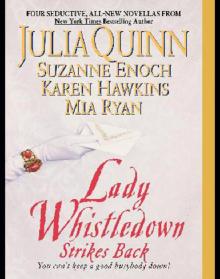 Lady Whistledown Strikes Back
Lady Whistledown Strikes Back Secret Diaries of Miss Miranda Cheever
Secret Diaries of Miss Miranda Cheever An Offer from a Gentleman with 2nd Epilogue
An Offer from a Gentleman with 2nd Epilogue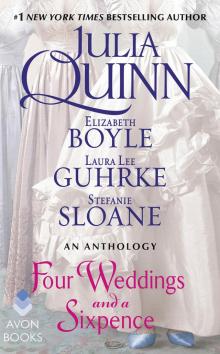 Four Weddings and a Sixpence
Four Weddings and a Sixpence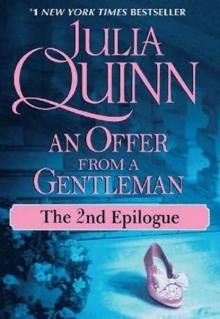 An Offer from a Gentleman: The Epilogue II
An Offer from a Gentleman: The Epilogue II The Further Observations of Lady Whistledown
The Further Observations of Lady Whistledown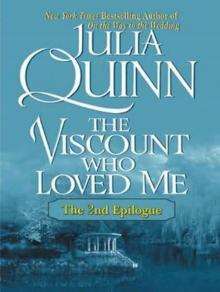 The Viscount Who Loved Me: The Epilogue II
The Viscount Who Loved Me: The Epilogue II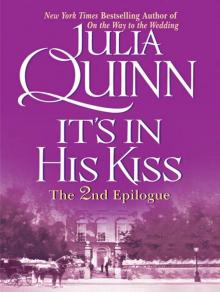 It’s In His Kiss Epilogue II
It’s In His Kiss Epilogue II To Sir Phillip, with Love: The Epilogue II
To Sir Phillip, with Love: The Epilogue II The Secret Diaries of Miss Miranda Cheevers
The Secret Diaries of Miss Miranda Cheevers A Night Like This (Smythe-Smith Quartet)
A Night Like This (Smythe-Smith Quartet) The Lady Most Likely...
The Lady Most Likely... Bridgerton 06: 2nd Epilogue - When He Was Wicked
Bridgerton 06: 2nd Epilogue - When He Was Wicked Just Like Heaven sq-1
Just Like Heaven sq-1 Gretna Greene
Gretna Greene